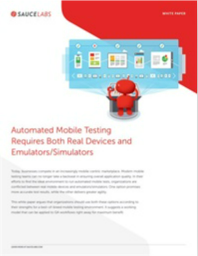Automated Mobile Testing Requires Both Real Devices and Emulators/Simulators
Today, businesses compete in an increasingly mobile-centric marketplace. Modern mobile testing teams can no longer take a backseat in ensuring overall application quality. In their efforts to find the ideal environment to run automated mobile tests, organizations are conflicted between real mobile devices and emulators/simulators. One option promises more accurate test results, while the other delivers greater agility.
This white paper argues that organizations should use both these options according to their strengths for a best-of-breed mobile testing environment. It suggests a working model that can be applied to QA workflows right away for maximum benefit.
Read More
By submitting this form you agree to Sauce Labs contacting you with marketing-related emails or by telephone. You may unsubscribe at any time. Sauce Labs web sites and communications are subject to their Privacy Notice.
By requesting this resource you agree to our terms of use. All data is protected by our Privacy Notice. If you have any further questions please email dataprotection@techpublishhub.com
Related Categories: AIM, Android, Apple, Applications, Cloud, Data Center, ERP, Hardware, Mobile Applications, Mobile Devices, Network, Operating System, SAN, Server, Software, Wi-Fi


More resources from Sauce Labs

A New Paradigm for Salesforce Testing
Just as low-code and no-code development tools are transforming velocity for the new ways that we work, low-code and no-code testing tools are also...

New Perspectives on Mobile Device Testing at ...
The old days of just translating the language in your app to make it readable to people in other countries are over. Now, the scope of truly making...

API Testing Automation and Monitoring: Avoid ...
Dive into the stories behind several devastating API bugs that impacted five well-known large enterprises. Learn how 'false positives' and other un...